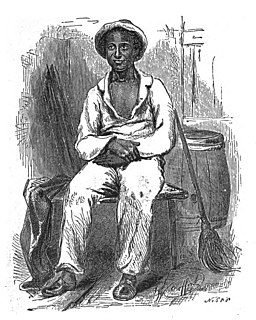A Quote by Ralph Waldo Emerson
Culture is the suggestion, from certain best thoughts, that a man has a range of affinities through which he can modulate the violence of any master-tones that have a droning preponderance in his scale, and succor him against himself. Culture redresses this imbalance, puts him among equals and superiors, revives the delicious sense of sympathy, and warns him of the dangers of solitude and repulsion.
Related Quotes
Who is left in the ghetto is the one man in a thousand in any age, in any culture, who through some mysterious workings of force within his soul will stand in defiance against any master. He is that one human in a thousand whose indomitable spirit will not bow. He is the one man in a thousand whose indomitable spirit cannot bow. He is the one man in a thousand who will not walk quietly to Umschlagplatz. Watch out for him, Alfred Funk, we have pushed him to the wall.
The mockery made him feel an outsider; and feeling an outsider he behaved like one, which increased the prejudice against him and intensified the contempt and hostility aroused by his physical defects. Which in turn increased his sense of being alien and alone. A chronic fear of being slighted made him avoid his equals, made him stand, where his inferiors were concerned, self-consciously on his dignity.
Often nothing keeps the pupil on the move but his faith in his teacher, whose mastery is now beginning to dawn on him .... How far the pupil will go is not the concern of the teacher and master. Hardly has he shown him the right way when he must let him go on alone. There is only one thing more he can do to help him endure his loneliness: he turns him away from himself, from the Master, by exhorting him to go further than he himself has done, and to "climb on the shoulders of his teacher."
Let a man attain the highest and broadest culture that any American has possessed, then let him die by sea-storm, railroad collision, or other accident, and all America will acquiesce that the best thing has happened to him; that, after the education has gone far, such is the expensiveness of America, that the best use to put a fine person to is to drown him to save his board.
From the State the exceptional individual cannot expect much. He is seldom benefited by being taken into its service; the only certain advantage it can give him is complete independence. Only real culture will prevent him being too early tired out or used up, and will spare him the exhausting struggle against culture-philistinism.
Christianity exhorted man to set himself up against Nature, but did so in the name of his spiritual and disinterested attributes. Pragmatism exhorts him to do so in the name of his practical attributes. Formerly man was divine because he had been able to acquire the concept of justice, the idea of law, the sense of God; today he is divine because he has been able to create equipment which makes him the master of matter.
At such times, the heart of man turns instictively towards his Maker. In prosperity, and whenever there is nothing to injure or make him afraid, he remembers Him not, and is ready to defy Him; but place him in the midst of dangers, cut him off from human aid, let the grave open before him, then it is, in the time of his tribulation, that the scoffer and unbelieving man turns to God for help, feeling there is no other hope, or refuge, or safety, save in his protecting arm.
Society is to the individual what the sun and showers are to the seed. It develops him, expands him, unfolds him, calls him out of himself. Other men are his opportunity. Each one is a match which ignites some new tinder in him unignitible by any previous match. Without these the sparks of individuality would sleep in him forever.
And what shall he suffer who slays him who of all men, as they say, is his own best friend? I mean the suicide, who deprives himself by violence of his appointed share of life. Not because the law of the state requires him. Nor yet under the compulsion of some painful and inevitable misfortune which has come upon him. Nor because he has had to suffer from irremediable and intolerable shame, but who from sloth or want of manliness imposes upon himself an unjust penalty.
Let a man choose what condition he will, and let him accumulate around him all the goods and gratifications seemingly calculated to make him happy in it; if that man is left at any time without occupation or amusement, and reflects on what he is, the meagre, languid felicity of his present lot will not bear him up. He will turn necessarily to gloomy anticipations of the future; and unless his occupation calls him out of himself, he is inevitably wretched.
He was resentful against all those in authority over him, and this, combined with a lazy indifference toward his work, exasperated every master in school. He grew discouraged and imagined himself a pariah; took to sulking in corners and reading after lights. With a dread of being alone he attached a few friends, but since they were not among the elite of the school, he used them simply as mirrors of himself, audiences before which he might do that posing absolutely essential to him. He was unbearably lonely, desperately unhappy.






































